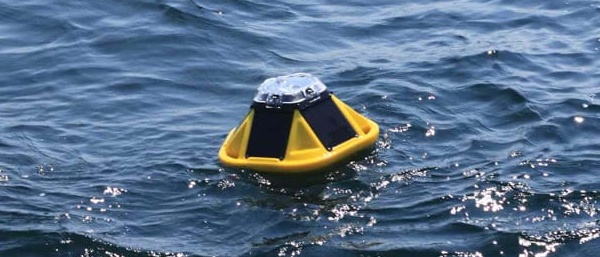The pros and cons of ocean digitization
From oceans of data to data about oceans, and what could go Smaug.
In these years, thanks to the extreme versatility of digital technologies, thousands of drones, smart buoys and other devices are generating oceans of data about oceans.

A Spotter Buoy, by Sofar Ocean
</em></u>
What could, no: MUST go well, soon
Ocean monitoring is nothing new: what is hugely increasing in this period is the magnitude of the process, and what is new is who drives it. All those devices can send all the data they mine from water directly to some data center on the mainland. Often in real time, for long periods, without human supervision.
These huge troves of data will produce, among other things:
- more accurate weather forecasts
- better understanding of how the oceans are responding to global warming
- routing services to help ships reduce fuel use, and steer clear of storms
This is great. We do need to know about the oceans much more than we could do without digital technologies, if we are to feed billions of people, minimize the deadly consequences of extreme weather, and generally reduce waste.
What may go wrong: the fencing
The “digitization” of oceans is half unavoidable, half really necessary, if not overdue, for the reasons I just mentioned. It is also unavoidable that the private sector plays a big part in this endeavour, through companies like Sofar (the buoy in the screenshot is one of their “Spotters”, or Saildrone. Of course, they are in the game for profit, and to a certain extent there is nothing wrong with that, as far as I am concerned.
There will be significant problems, however, if all the digital data mined by those players will become oceans of totally privately controlled data.
These three quotes from the Washington Post piece contain what may go bad:
1: “The data coming from [the Spotter buoys] goes into a proprietary marine weather prediction model and can also be used to help improve models run by others, including government agencies."
2: “If… we can actually help industries perform better, save them money by collecting more ocean data… ocean sensing is going to change fundamentally."
3: All this activity is _“an example of what the private sector is increasingly capable of doing on land, sea, air and in space namely, gathering data, processing it and selling it to paying customers, as well as providing it to government agencies.
Western hubris is strong with these ones, isn’t it? And this is the second time in one month that I see it applied to oceans. Just like with the night sky, of course.
The private sector is in the game for the money and, again, nothing wrong about that by me. But oceans are global. Oceans are a global Commons. It is worrying, and dangerous, to privatize knowledge about something like the oceans. Even if all one is concerned is economically sustainable economic “growth”.
Profit, OK. But it should be cause of serious concern, and of appeals to lawmakers worldwide, to see, in those quotes, access to data considered only for who can pay lots of money, or shut you down with one bill. What about universities or, to make just an example, fishing cooperatives? Especially in developing countries, but not just there?
Take Brexit, for example

You will take NO FISHING DATA from me!
</em></u>
A significant co-cause of Brexit, that still stirs fierce debates and will continue to do so for years, is fishing rights.
Private fleets of ocean data miners, however, may make many similar debates moot, or at least severely unbalanced, all over the world. If oceans data only end up in very few, strongly guarded caves, only the very few who can enter them with super-money, or super-force, will know where their boats should go fishing every day. Or which terms in a fishing rights treaty would give them an unfair advantage. Not good.
PS: don’t forget that all the concerns expressed here also apply, at least in principle, to weather.
Who writes this, why, and how to help
I am Marco Fioretti, tech writer and aspiring polymath doing human-digital research and popularization.
I do it because YOUR civil rights and the quality of YOUR life depend every year more on how software is used AROUND you.
To this end, I have already shared more than a million words on this blog, without any paywall or user tracking, and am sharing the next million through a newsletter, also without any paywall.
The more direct support I get, the more I can continue to inform for free parents, teachers, decision makers, and everybody else who should know more stuff like this. You can support me with paid subscriptions to my newsletter, donations via PayPal (mfioretti@nexaima.net) or LiberaPay, or in any of the other ways listed here.THANKS for your support!